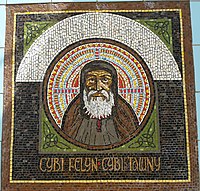Cybi
Saint Cybi | |
|---|---|
 | |
| Abbot of Caer-Gybi | |
| Born | 483[1] Cornwall, England |
| Died | 8 November 555 |
| Venerated in | Roman Catholic Church Eastern Orthodoxy Anglican Communion |
| Canonized | Pre-Congregation |
| Feast | 8 November 13 August in Cornwall |
| Patronage | Cuby, Cornwall Landulph, Cornwall Llangibby, Monmouthshire, Wales Llangybi, Cardigan, Wales Tregony, Cornwall Kenwyn, Cornwall |
Saint Cybi (in Welsh) or Saint Cuby (in Cornish) was a 6th-century Cornish bishop, saint and, briefly, king, who worked largely in North Wales: his biography is recorded in two slightly variant medieval 'lives'.[2]
Life in Cornwall
According to the 'Life of Saint Cybi', this saint was the son of Salomon, a 'warrior prince', generally thought to have been a King of Cornwall. In the 'Bonedd y Saint', his father's name is given the Welsh form, Selyf. His mother, Saint Wenna (Gwen ferch Cynyr), was sister to Saint Non.[3]
He was raised as a Christian and, in early life, went on a pilgrimage to Rome and Jerusalem. He became a priest and was consecrated as a bishop, before he arrived home to find that his father was dead and he was King of Cornwall. Cybi politely declined the throne and, instead, travelled through his kingdom, preaching to the people and building churches at Duloe, Tregony, Cubert and Landulph.
Life in Wales
He then moved on to south Wales, founding churches at Llangybi between Usk and Caerleon in Monmouthshire, and Llanddyfrwyr-yn-Edeligion, before spending some time in Ireland. He eventually sailed for north Wales, settling at Llangybi on the Llŷn peninsula. Off Anglesey, King Maelgwn Gwynedd gave him the old Roman fort at Holyhead (subsequently known, in Welsh, as Caer Gybi, "Cybi's Fort") on Holy Island (thence called Ynys Gybi, "Cybi's Island"). He founded a large and important monastery there in the area where St Cybi's Church is now located.
Cybi was a great friend of Saint Seiriol. He would always face the Sun while travelling to meet him and his resulting tanned complexion led to him being known as Cybi Felyn or Cybi the Tanned. He is also said to have attended the Synod of Llanddewi Brefi in Ceredigion where he advised some pilgrims on their journey to Ynys Enlli (Bardsey). Rhyd-y-Saint railway station (English: Saints' Ford) on the Red Wharf Bay branch line near Pentraeth, was named so as Cybi and Seiriol are said to have met there.
Cybi died on 8 November 555 and was buried in Eglwys y Bedd (the Chapel of the Grave) adjoining his monastery at Holyhead.[4]
References and bibliography
- ^ "EBK: St. Cybi Felyn". www.earlybritishkingdoms.com.
- ^ Breverton, T. D. (2000) The Book of Welsh Saints. ISBN 1-903529-01-8.
- ^ Maddern, Eric (October 5, 2015). "Snowdonia Folk Tales". The History Press – via Google Books.
- ^ Doble, G. H. (1964) The Saints of Cornwall: part 3. Truro: Dean and Chapter; pp. 105-132
